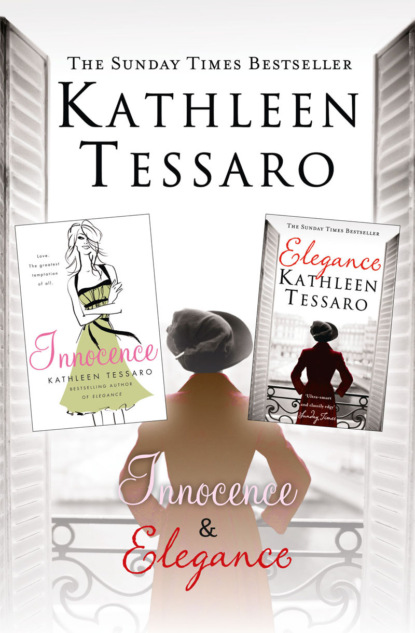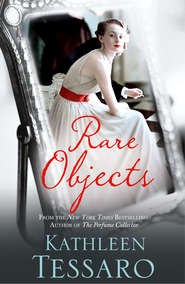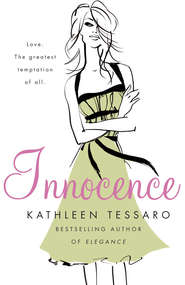По всем вопросам обращайтесь на: info@litportal.ru
(©) 2003-2025.
✖
Elegance and Innocence: 2-Book Collection
Автор
Год написания книги
2018
Настройки чтения
Размер шрифта
Высота строк
Поля
‘I got them from Hatton Garden. We can have them made into a ring.’
I should say something – act surprised or pleased, but instead I just stare at the packet, unable to form any cohesive thought other than shock and dismay.
‘Louise, I’m here … on my knees before you. I know we’ve been having difficulties. And …’ I have the uneasy feeling he’s rehearsed this; he’s looking down now, taking a pregnant pause. ‘And I want you to have this, to know that I love you, that I’m sorry.’
He looks up at me again.
It’s my cue. My head is pounding; say something nice, something conciliatory, it screams at me. But when I speak, my voice is cold and flat.
‘Exactly what do you want me to have? Some coloured stones in a bag?’
He blinks at me.
‘This isn’t a ring, is it?’
‘Yes, but … but it could be.’
‘But it isn’t. What kind of stones are these?’
He shakes his head. ‘I don’t know the names.’
And then I find myself doing something very unexpected; I hand the bag back to him. ‘Why don’t you get up,’ I say.
He stares at me in amazement. ‘Louise, please!’
‘Please what?’ I’m suddenly overwhelmingly angry. I want him off the floor. I don’t want to be a part of this charade anymore. It’s offensive. All of it; the stones, the speech. ‘Why are you doing this?’ I demand. ‘Why are you doing this now, after all this time?’
‘I … I’m doing it because I don’t want you to leave.’
‘Why?’ I persist. ‘What difference does it make whether I stay or go?’
He just kneels there, staring at me.
‘Be honest, you don’t really want me, do you? I mean, it’s not like you want to touch me, do you?’
‘I do want to touch you,’ he says, his eyes not meeting mine.
‘Then why don’t you?’
But he just shakes his head, over and over.
And I snap.
‘Why are you doing this?’ I shout, my voice so loud and shrill it doesn’t even sound like it’s coming from me. ‘Just tell me! Say it! Why?’
‘Because,’ he whispers, his hands trembling as they cover his face, ‘I cannot trust myself when you’re gone.’
My husband and I are having a ‘trial separation’.
Colin is looking for someone to rent his spare room. I tell him that person is me and he blinks in surprise and asks, wide-eyed, if there’s anything he can do. No, I say, there’s nothing to be done. And of that, I’m sure.
It’s been months now – months of conversations, arguments, silences, tears. We have ‘given it one more week’ again and again and again. It’s like trying to amputate a limb with a spoon.
We make it to the end of the month, to the end of another excruciating month, and then I move out.
It’s a Tuesday. My husband offers to help me pack my bags.
‘I’m not going on holiday,’ I tell him, repulsed and amazed that he can imagine us standing side by side, taking things off hangers and folding them into piles. He stares at me, numbly.
‘I’m leaving you,’ I explain, saying the words slowly and loudly, the way you speak to a deaf person. ‘This is me packing my bags and leaving you.’ But he just blinks.
‘I’ll pay for the cab,’ he says. He reaches for his wallet and examines the notes. I watch as he calculates in his head how much he can spare. He puts back the twenty for later. And I want to hit him, to cry, to tear through the fabric of our life together like it’s a badly painted backdrop and get to the point at last. He fumbles. Pulls out a tenner. And we’ve been here before; we’ve been right here, in this same, exact spot for a very long time.
I let him put the money on the table. I turn and walk into the bedroom and take down my suitcase, the one I brought to England when I thought I was going to be a famous actress, and start filling it with clothes.
My husband goes out for a walk and when he comes back I’m gone.
Colin lives with his flatmate Ria, a glassblower and gallery manager, in South London, beyond the urban chic of Brixton. Gone are the exclusive cafés and lunchtime concerts of Westminster, replaced by the gaudy splendour of the Streatham Mega Bowl and the late night Mecca Bingo parlour.
The cab driver helps me to unload my bags and haul them up the front steps. I ring the bell and the door opens to reveal Colin in his bathrobe, hair wet from the shower and Madonna blaring in the background.
I stare at the misshapen collection of bags, suddenly too overwhelming and unwieldy to move. ‘I’m sorry, Col. What am I doing? What have I done?’
He wraps an arm gently around my shoulders. ‘Come inside. Sit down. And I’ll make us a nice, hot cup of tea.’
K Knitwear (#ulink_8c4c2675-27b3-5de8-a81f-249fd1b82767)
Few women can resist the temptation of a soft new pullover in a luscious shade, and how right they are! If you feel the cold, as I do, then it is really the only garment that will keep you comfortable and content from morning till night, in all kinds of seasons, in both the country and in town. The sweater is the grand-mère of the fashion world: warm, loving, and totally forgiving. (Unless, of course, you are afflicted with a very large bust. Then it is in your interest to stick to less clinging fabrics.)
Made from silk for the warmer days and of cashmere when it becomes bitter, a good sweater has no rival. And with a little care and attention, it will last years and years without the slightest sign of age. In these whirlwind times of changing fashions, it is reassuring to know that a camel or navy twin set will continue to be elegant for seasons to come. It is a perfect example of the modern trend towards ease and comfort.
During the first days at Colin’s, I fall into a kind of stupor, going to work in a daze and returning to spend the evening rolled into a little ball on my bed, crying and staring at the ceiling. The garment of choice during this bleak period is, morbidly enough, a worn navy cashmere jumper of my husband’s. For years I’ve had a clandestine relationship with this jumper, curling into its warm, forgiving softness like a child clings to a favourite blanket. I used to sneak it from his cupboard when he was out at the theatre; racing to return it when I heard his key turn in the lock.
I hadn’t intended to steal it and I’m not even sure why I did. It was draped over a chair in the corner of the bedroom and I just slipped it into my case along with the rest of my clothes. It’s his favourite; it will be missed. And maybe that has something to do with it. Perhaps I’m waiting to see which one of us he wants back first.
Then the blue envelopes started to come, letters from my husband.
I’m sorry … I’ve failed you … so sorry.
They go on and on, saturated with regret and remorse, but not one of them asking me to come home.
I had expected something more. A grand gesture: he’d appear in a cab in the middle of the night and insist upon taking me home. Or he might ambush me as I left the theatre, his arms filled with roses. Part of me dreads the idea of spotting him, thin and haggard, smoking on a street corner, waiting for me. But I dread even more the empty corners that appear, with haunting regularity, as the days go by, and the consciousness of the resigned ease with which he’s let me go. The letters are not declarations of love or pleas for resolution or even promises for the future but persistent, miserable apologies to which there is really no reply. He’s letting me know, in his own quiet way, that all the street corners will be empty from now on.
I sit in my room crying, choking and spluttering, rocking back and forth, blowing my nose on roll after roll of toilet tissue. I cannot go back but I cannot bear to be where I am. Colin tries to coax me out with various culinary delights; nearly new bourbon biscuits, slightly crushed chocolate éclairs, and chicken korma made fresh from a jar (special offer, two for the price of one). But I’ve lost my appetite. Instead, I stagger down to the Indian shop on the corner to buy single cans of spaghetti, eating them, more often than not, straight from the tin.
Even Ria, who’s never met me before and who has more than enough reason to be wary of the obscene lack of mental health in her new flatmate, makes a few tentative overtures. She offers to help me unpack my bags and make my bed up with some pretty linen and even lends me a delicate, 1930s lamp from her collection of prized objects. But it’s no use. I don’t want to unpack my bags. My bed is far too small to bother with pretty sheets and as for decorating the room, who cares. It’s over. I’m finished. Over the years I’ve transformed from a budding, young actress into a bitter, disillusioned box office manager, selling tickets to plays I could have been in. I’m thirty-two years old, living in a broom cupboard with a theatre queen and a spinster.
I take a few days off of work. And then a few more. When I do show up, eyes red and swollen from crying, I have the concentration of a three-year-old. The same things must be repeated three and four times before I can take them on board. I make mistakes. My colleagues cover for me, finally delegating simple, manual tasks for me to blunder instead. All decisions seem completely overwhelming, even simple ones, like what kind of sandwich to have for lunch. I side step this quandary by not eating at all. My weight plummets and I can’t find the energy to wash my hair or organize clean shirts. I wear the same dress day after day, like a uniform. But I don’t care. All I want to do is go home, close my bedroom door, and fall asleep in the jumper that still smells of him, feels like him, reminds me of him.











